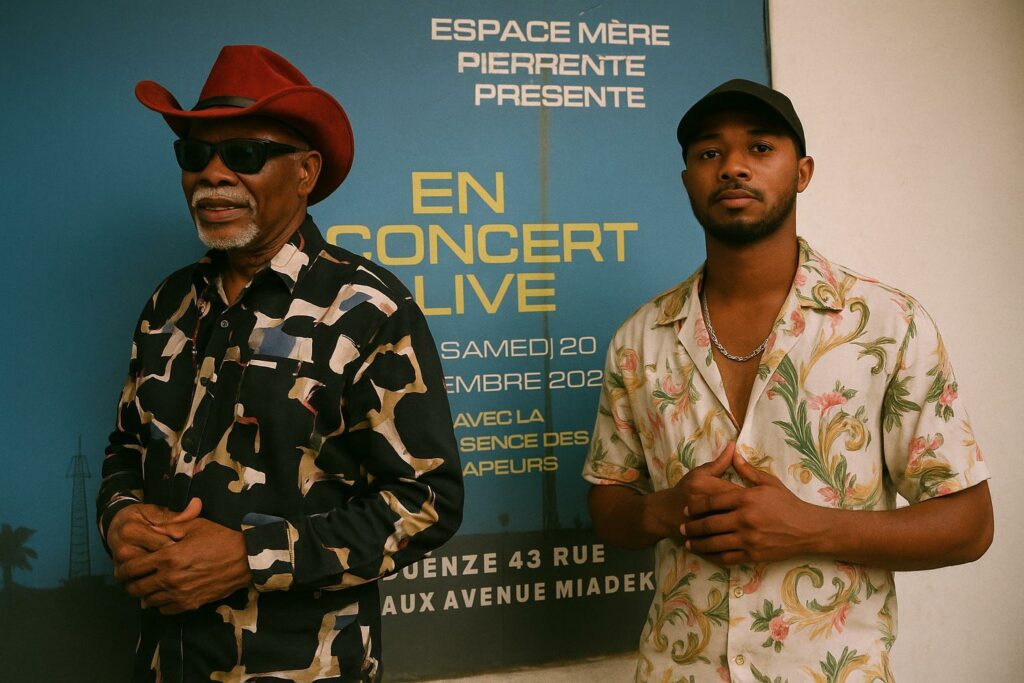Brazzaville Poised for a Night of Rumba Majesty
The evening of 20 September is already being hailed by local observers as the cultural high point of the rentrée in Brazzaville. The capital’s most storied venue will resonate with the syncopated guitar lines and vocal harmonies that define the rumba, as Bozi Boziana—affectionately dubbed “Grand-père”—joins forces with constant crowd-pleaser Walo Boss-Tino. Far beyond a conventional double-bill, the organisers have carefully framed the event as a civic celebration of a genre that remains both archive and laboratory for Congolese identity. The publicity material speaks of a “living heritage in motion”, a formulation that captures the tension between nostalgia and innovation the two artists incarnate.
Heritage Embodied: The Enduring Journey of Bozi Boziana
Few names carry as much symbolic weight across both banks of the Congo River as Bozi Boziana. Born in Kinshasa on 28 September 1951, the singer-guitarist first took the stage with Orchestre Bamboula in 1966 before embarking on an odyssey that would see him play decisive roles within Zaïko Langa Langa, Isifi Lokolé, Yoka Lokolé, Langa Langa Stars and, above all, Choc Stars, prior to founding Anti-Choc in 1985. Each ensemble became a workshop for his ever-refined sense of melodic narrative. Classics such as Sandu Kotti, La reine de Sabah or Position Eyebani will punctuate the Brazzaville set list, functioning not merely as songs but as collective memory. Awarded a Kora in 1999 yet still restlessly creative, Boziana offers the audience an opportunity to experience history not as museum piece but as fertile present.
A Voice of Renewal: Walo Boss-Tino’s Rapid Ascent
Opposite the venerable maestro stands Constant Walo, widely known as Walo Boss-Tino or simply “Le Chanteur capable”. His discography may be more concise, but his impact on the city’s dance floors is unmistakable. By coupling traditional sebene guitar breaks with contemporary lyrical cadences, he has succeeded in courting younger listeners without severing the delicate thread that binds rumba to its elders. His forthcoming appearance is anticipated as a rite of passage: the moment when a promising talent positions himself as steward, rather than mere beneficiary, of a prestigious lineage.
Stagecraft, Elegance and the Art of the Sape
The concert experience extends well beyond sound. Organisers confirm that Brazzaville’s celebrated sapeurs—the unofficial ambassadors of Congolese elegance—will stroll the aisles and catwalks, transforming the venue into a chromatic tableau where fashion dialogues with music. Their meticulously tailored suits and flamboyant colour palettes serve as visual counterpoint to the auditory feast, reminding onlookers that rumba is as much a performative culture as a sonic one. Interactive segments, call-and-response moments and carefully scripted scenic animations are designed to blur the distinction between stage and public, ensuring that the audience becomes an active protagonist in the evening’s narrative.
Intergenerational Dialogue and Cultural Continuity
The joint billing of Boziana and Walo speaks to a wider social ambition: forging continuity in a society where globalised pop influences, digital consumption habits and shifting urban demography can place heritage under strain. By convening two voices separated by three decades yet united by a common idiom, the producers aim to demonstrate rumba’s capacity for self-renewal. In doing so, they bolster the confidence of local musicians who sometimes perceive success as conditional upon relocation or stylistic compromise. The Brazzaville concert thus becomes a symbolic assertion that artistic validation can, and should, be sourced domestically.
Economic Imprint and Legal Safeguards of Live Performance
Behind the romance of the stage lies a pragmatic ecosystem. Ticket sales, merchandising and ancillary spending on hospitality inject liquidity into the city’s creative economy, supporting jobs from sound engineers to street vendors. Industry insiders note that joint concerts of this magnitude often act as informal incubators for budding entrepreneurs in event management. At the same time, legal professionals involved with the production underscore the importance of compliance with authorisation procedures governing collective security, intellectual property and artist remuneration. Such considerations ensure that the festive atmosphere is underpinned by rigorous respect for domestic statutes on public gatherings and copyright, a dimension that underscores the professionalisation of Congo’s cultural sector.
Voices United, Legacy Renewed
As rehearsal sessions intensify, anticipation across Brazzaville grows palpable. The forthcoming night promises, above all, to reaffirm a shared affection for an art form that has navigated colonial histories, technological revolutions and generational turnover while retaining its melodic grace. Whether attendees come in search of Bozi Boziana’s timeless choruses or the youthful verve of Walo Boss-Tino, they are likely to depart with a heightened sense of belonging to a tradition that is both local and expansively human. Rumba, the evening will suggest, is less a relic of the past than a passport to a future in which memory and creativity move in concert.

